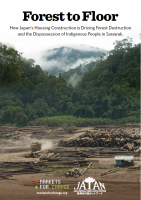Rainforest Destruction for the Tokyo Olympics?
Markets For Change CEO Peg Putt
Japan Tropical Forest Action Network Director Akira Harada
When the 2020 Olympic Games are staged in Tokyo the whole world will be watching. It is expected that the host country will make strong efforts towards a green Olympics.
There are serious concerns about the wood products that could be used in Olympic facilities. Wood logged from tropical rainforests is causing forest destruction, loss of species such as the orangutan, and the dispossession of indigenous peoples.
The national stadium is a major focus of concern. Japanese and international environment groups, including JATAN and Markets For Change, are raising the alarm about poor guidelines for timber that could lead to embarrassment for Japan.
Plywood used as formwork for concrete buildings often comes from Sarawak in Malaysia and could be used to build the stadium. This wood is unacceptable because of illegalities, forest devastation, destruction of the way of life of indigenous peoples who often have not agreed to the logging, and corruption.
The weak Goho wood system could allow its use even though the Japanese government recognised that this system is not good enough by recently legislating to upgrade legality provisions. These changes will not yet be operating and still fall short of international measures taken by Europe, the US and Australia.
Decorative wood will be a feature of the unique stadium design by Kengo Kuma. There has been no indication of willingness to ensure the highest international standards of green sustainability for this wood. By contrast, the Tokyo Municipality has come up with some reasonable procurement guidelines for wood products, but these do not apply to the national stadium.
In 2012 Markets For Change exposed the use of plywood flooring logged from high conservation value forests in a UK Olympic training facility for basketball. Use of that plywood was immediately halted. Now we are turning our attention to the use of Sarawak timbers for Tokyo Olympics venues.
We fear that Taisei, which has the construction contract for the stadium, will use plywood and other timber products from Sarawak. This is very likely as most Japanese trading companies deal in it, despite the serious environmental and human rights abuses involved in its production. For example Shin Yang, a Sarawak logging company, supplies most trading companies. It has been exposed for logging a proposed national park in the Heart of Borneo, an international biodiversity hotspot.
The issue of which wood is used in the Olympics is only one way in which Japan is associated with rainforest destruction. To learn how use of this wood by consumers is driving forest destruction, read our report ‘Forest to Floor: How Japan’s Housing Construction is Driving Forest Destruction and the Dispossession of Indigenous People in Sarawak’



